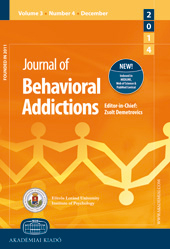Reward and Punishment Sensitivity in Women with Gambling Disorder or Compulsive Buying: Implications in Treatment Outcome
Reward and Punishment Sensitivity in Women with Gambling Disorder or Compulsive Buying: Implications in Treatment Outcome
Author(s): Gemma Mestre-Bach, Roser Granero, Trevor Steward, Fernando Fernández-Aranda, Marta Bano, Neus Aymami, Mónica Gómez-Pena, Zaida Agüera, Núria Mallorqui-Bagué, Laura Moragas, Amparo Del Pino-Gutiérrez, Carles Soriano-Mas, Juan F. Navas, José C. Perales, José M. Menchón, Susana Jiménez-MurciaSubject(s): Gender Studies, Cognitive Psychology, Clinical psychology, Behaviorism, Substance abuse and addiction, Socio-Economic Research
Published by: Akadémiai Kiadó
Keywords: compulsive buying; gambling disorder; cognitive-behavioral therapy; dropout; relapse; reward and punishment sensitivity;
Summary/Abstract: Gray’s Reinforcement Sensitivity Theory has been widely applied to different clinical populations, but few studies have reported empirical evidence based on this theory for treatment outcomes in patients with gambling disorder (GD) and compulsive buying (CB). The aims of this study were to explore the association between clinical variables and personality traits with reward and punishment sensitivity (RPS) levels in women (n = 88) who met diagnostic criteria for GD (n = 61) and CB (n = 27), and to determine the predictive capacity of RPS for primary short-term outcomes in a cognitive-behavioral therapy (CBT) intervention. Methods: The CBT intervention consisted of 12 weekly sessions. Data on patients’ personality traits, RPS levels, psychopathology, sociodemographic factors, GD, and CB behavior were used in our analysis. Results: High RPS levels were associated with higher psychopathology in both CB and GD, and were a risk factor for dropout in the CB group. In the GD group, higher reward sensitivity scores increased the risk of dropout. Discussion and conclusions: Our findings suggest that both sensitivity to reward and sensitivity to punishment independently condition patients’ response to treatment for behavioral addictions. The authors uphold that CBT interventions for such addictions could potentially be enhanced by taking RPS into consideration.
Journal: Journal of Behavioral Addictions
- Issue Year: 5/2016
- Issue No: 4
- Page Range: 658-665
- Page Count: 8
- Language: English

